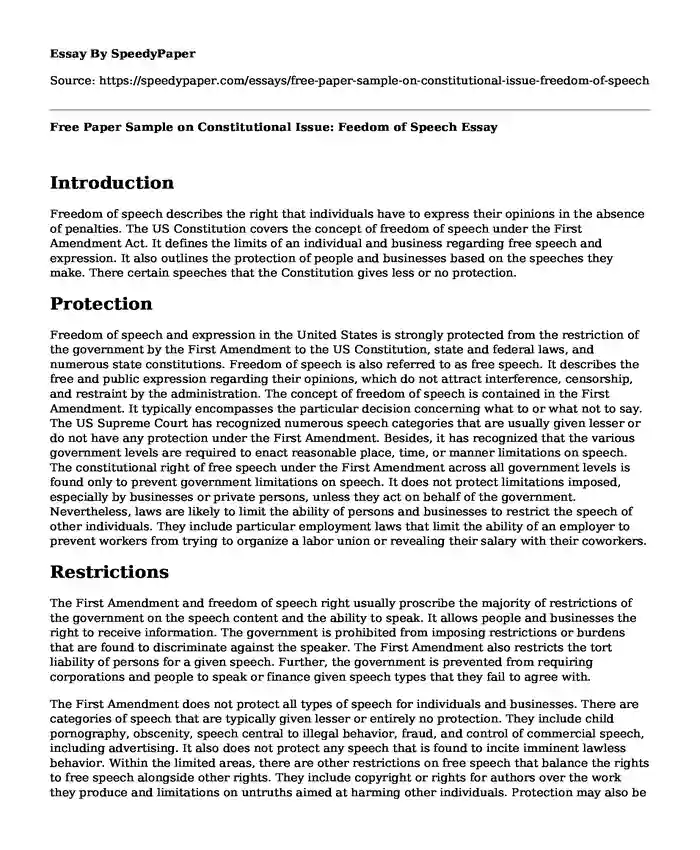
| Type of paper: | Essay |
| Categories: | United States Constitution Human rights |
| Pages: | 3 |
| Wordcount: | 648 words |
Introduction
Freedom of speech describes the right that individuals have to express their opinions in the absence of penalties. The US Constitution covers the concept of freedom of speech under the First Amendment Act. It defines the limits of an individual and business regarding free speech and expression. It also outlines the protection of people and businesses based on the speeches they make. There certain speeches that the Constitution gives less or no protection.
Protection
Freedom of speech and expression in the United States is strongly protected from the restriction of the government by the First Amendment to the US Constitution, state and federal laws, and numerous state constitutions. Freedom of speech is also referred to as free speech. It describes the free and public expression regarding their opinions, which do not attract interference, censorship, and restraint by the administration. The concept of freedom of speech is contained in the First Amendment. It typically encompasses the particular decision concerning what to or what not to say. The US Supreme Court has recognized numerous speech categories that are usually given lesser or do not have any protection under the First Amendment. Besides, it has recognized that the various government levels are required to enact reasonable place, time, or manner limitations on speech. The constitutional right of free speech under the First Amendment across all government levels is found only to prevent government limitations on speech. It does not protect limitations imposed, especially by businesses or private persons, unless they act on behalf of the government. Nevertheless, laws are likely to limit the ability of persons and businesses to restrict the speech of other individuals. They include particular employment laws that limit the ability of an employer to prevent workers from trying to organize a labor union or revealing their salary with their coworkers.
Restrictions
The First Amendment and freedom of speech right usually proscribe the majority of restrictions of the government on the speech content and the ability to speak. It allows people and businesses the right to receive information. The government is prohibited from imposing restrictions or burdens that are found to discriminate against the speaker. The First Amendment also restricts the tort liability of persons for a given speech. Further, the government is prevented from requiring corporations and people to speak or finance given speech types that they fail to agree with.
The First Amendment does not protect all types of speech for individuals and businesses. There are categories of speech that are typically given lesser or entirely no protection. They include child pornography, obscenity, speech central to illegal behavior, fraud, and control of commercial speech, including advertising. It also does not protect any speech that is found to incite imminent lawless behavior. Within the limited areas, there are other restrictions on free speech that balance the rights to free speech alongside other rights. They include copyright or rights for authors over the work they produce and limitations on untruths aimed at harming other individuals. Protection may also be made on communication with an individual in prison. Moreover, protection may be found in potential or imminent violence against certain individuals.
Conclusion
The United States Constitution has helped solve free speech issues in the country. The right to freedom of speech is covered in the US Constitution, and people are free to express themselves under the protection of the law. However, the Constitution identifies particular areas such as fraud, obscenity, or illegal behavior speeches, where it gives less or no protection.
Bibliography
Epstein, Richard A. "A Common Law for the First Amendment." HARv. JL & PuB. PoL'Y 41 (2018): 1.
McKeown, M. Margaret. "Censorship in the Guise of Authorship: Harmonizing Copyright and the First Amendment." Chi.-Kent J. Intell. Prop. 15 (2016): 1.
Peel, Patrick. "The argument for the freedom of speech and press during the ratification of the US Constitution, 1787–88." Freedom of speech, 1500–1850. Manchester University Press, 2020.
Cite this page
Free Paper Sample on Constitutional Issue: Feedom of Speech. (2023, Nov 15). Retrieved from https://speedypaper.com/essays/free-paper-sample-on-constitutional-issue-freedom-of-speech
Request Removal
If you are the original author of this essay and no longer wish to have it published on the SpeedyPaper website, please click below to request its removal:
- Sarbanes-Oxley and Corporate Governance Paper. Free Essay Sample.
- Business Essay Example on Single-Member Companies in Thailand
- Employment Law Essay Example: Is Sofie an Employee or an Independent Contractor?
- The Difference between Revenge and Justice
- Essay Example on Protecting Patients: A Nurse's Essential Role
- Advantages of Building Space for the Orthopedic Line. Essay Example
- Future of American Society - Free Paper Sample
Popular categories




